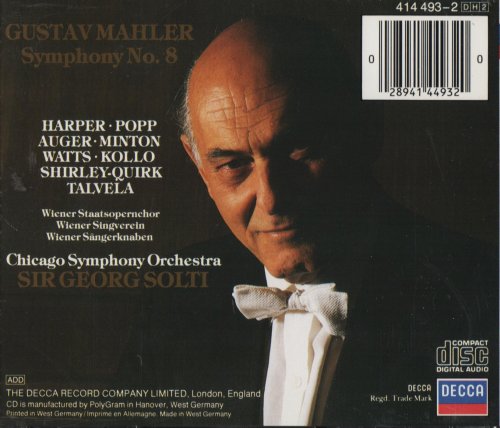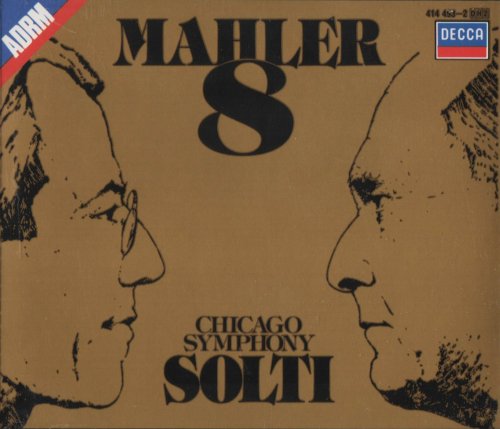
Chicago Symphony Orchestra, Sir Georg Solti - Mahler: Symphony No. 8 (1985) CD-Rip
BAND/ARTIST: Chicago Symphony Orchestra, Sir Georg Solti
- Title: Mahler: Symphony No. 8
- Year Of Release: 1985
- Label: Decca
- Genre: Classical
- Quality: FLAC (image+.cue,log,scans)
- Total Time: 01:19:40
- Total Size: 492 Mb
- WebSite: Album Preview
Tracklist:
CD 1
Symphony No. 8, Part One
01. Veni, Creator Spiritus - 00:01:28
02. Imple Superna Gratia - 00:04:26
03. Infirma Nostri Corporis - 00:06:41
04. Accende Lumen Sensibus - 00:04:23
05. Veni, Creator Spiritus - 00:04:07
06. Gloria Patri Domino - 00:02:10
CD 2
Symphony No. 8, Part Two
07. Poco Adagio - Waldung, Sie Schwankt Heran - 00:14:14
08. Ewiger Wonnebrand - 00:01:35
09. Wie Felsenabgrund Mir Zu Füßen - 00:04:44
10. Gerettet Ist Das Edle Glied - 00:03:00
11. Uns Bleibt Ein Erdenrest - Hier Ist Die Aussicht Frei - 00:02:59
12. Höchste Herrscherin Der Welt - Dir, Der Unberührbaren - 00:08:08
13. Bei Der Liebe, Die Den Füßen - 00:04:54
14. Neige, Neige, Du Ohnegleiche - 00:05:18
15. Blicket Auf Zum Retterblick - 00:06:01
16. Alles Vergängliche - 00:05:28
Performers:
Heather Harper - soprano
Lucia Popp - soprano
Arleen Auger - soprano
Yvonne Minton - contralto
Helen Watts - contralto
René Kollo - tenor
John Shirley-Quirk - baritone
Martti Talvela - bass
Wiener Staatsopernchor
Wiener Singverein
Wiener Sängerknaben
Chicago Symphony Orchestra
Sir Georg Solti - conductor

CD 1
Symphony No. 8, Part One
01. Veni, Creator Spiritus - 00:01:28
02. Imple Superna Gratia - 00:04:26
03. Infirma Nostri Corporis - 00:06:41
04. Accende Lumen Sensibus - 00:04:23
05. Veni, Creator Spiritus - 00:04:07
06. Gloria Patri Domino - 00:02:10
CD 2
Symphony No. 8, Part Two
07. Poco Adagio - Waldung, Sie Schwankt Heran - 00:14:14
08. Ewiger Wonnebrand - 00:01:35
09. Wie Felsenabgrund Mir Zu Füßen - 00:04:44
10. Gerettet Ist Das Edle Glied - 00:03:00
11. Uns Bleibt Ein Erdenrest - Hier Ist Die Aussicht Frei - 00:02:59
12. Höchste Herrscherin Der Welt - Dir, Der Unberührbaren - 00:08:08
13. Bei Der Liebe, Die Den Füßen - 00:04:54
14. Neige, Neige, Du Ohnegleiche - 00:05:18
15. Blicket Auf Zum Retterblick - 00:06:01
16. Alles Vergängliche - 00:05:28
Performers:
Heather Harper - soprano
Lucia Popp - soprano
Arleen Auger - soprano
Yvonne Minton - contralto
Helen Watts - contralto
René Kollo - tenor
John Shirley-Quirk - baritone
Martti Talvela - bass
Wiener Staatsopernchor
Wiener Singverein
Wiener Sängerknaben
Chicago Symphony Orchestra
Sir Georg Solti - conductor
Within my experience of Mahler performances, the Eighth Symphony is the most difficult of the ten for a conductor to `bring off' successfully. Like the Second, it is very much a public ceremonial piece, but for every dozen effective performances of No. 2, one would be lucky to encounter one or two of No. 8. The number of soloists is one handicap, for example—they must all be good. And the choir is put under almost as much strain in Part I as in the finale of Beethoven's Ninth Symphony. Again, there is the interpretative problem of balancing and reconciling Parts 1 and 2. Solti's Decca recording, made with the Chicago Symphony Orchestra and Vienna choirs in Vienna in 1971, is one of the most convincing performances of the symphony imaginable. It was a superb recording on LP, and its transfer to CD is a triumph, revealing even more detail and projecting even more powerfully the grandeur and majesty of Solti's conception.
Ozawa's interpretation on Philips has been harshly criticized, not entirely fairly, in my view. It is different from Solti's, although their timings are almost identical, but it is by no means episodic, as has been suggested, and achieves a satisfactory apotheosis. He remembers that the symphony had deeply personal significance for Mahler and sees it from this angle rather than as an epic. Unfortunately his performance has not been nearly so well recorded; balance and dynamic levels being inferior. Nor can the Tanglewood Festival Chorus be remotely compared with the Vienna voices at Solti's command. Solti, too, has the better team of soloists, though I prefer Kenneth Riegel as Doctor Marianus to Rene Kollo. Talvela (Solti) is too near the microphone but is superior to ,Gwynne Howell for Ozawa in sheer power. Both Lucia Popp (Solti) and Judith Blegen (Ozawa) sing with the purity of intonation needed for Gretchen, but the crucial intervention of the Mater Gloriosa with "Komm! Hebe dich" is properly exalted on the Solti disc from Arleen Auger whereas Ozawa's Deborah Sasson is a disappointment.
Both orchestras play superbly; it would be invidious to adjudicate between them, in Part 2 especially. But at a passage such as the Adagissimo at fig. No. 106 in Part 2, while Ozawa's tempo is perhaps truer, Solti draws such intensity of phrasing from the Chicago strings that he carries full conviction. Also the harmonium is clearly recorded here by Decca: its contribution to the tone-colour at this passage is important.
Ozawa's interpretation on Philips has been harshly criticized, not entirely fairly, in my view. It is different from Solti's, although their timings are almost identical, but it is by no means episodic, as has been suggested, and achieves a satisfactory apotheosis. He remembers that the symphony had deeply personal significance for Mahler and sees it from this angle rather than as an epic. Unfortunately his performance has not been nearly so well recorded; balance and dynamic levels being inferior. Nor can the Tanglewood Festival Chorus be remotely compared with the Vienna voices at Solti's command. Solti, too, has the better team of soloists, though I prefer Kenneth Riegel as Doctor Marianus to Rene Kollo. Talvela (Solti) is too near the microphone but is superior to ,Gwynne Howell for Ozawa in sheer power. Both Lucia Popp (Solti) and Judith Blegen (Ozawa) sing with the purity of intonation needed for Gretchen, but the crucial intervention of the Mater Gloriosa with "Komm! Hebe dich" is properly exalted on the Solti disc from Arleen Auger whereas Ozawa's Deborah Sasson is a disappointment.
Both orchestras play superbly; it would be invidious to adjudicate between them, in Part 2 especially. But at a passage such as the Adagissimo at fig. No. 106 in Part 2, while Ozawa's tempo is perhaps truer, Solti draws such intensity of phrasing from the Chicago strings that he carries full conviction. Also the harmonium is clearly recorded here by Decca: its contribution to the tone-colour at this passage is important.

DOWNLOAD FROM ISRA.CLOUD
Chicago Symphony Orchestra, Sir Georg Solti - Mahler Symphony No. 8 (1985) CD-Rip.rar - 492.2 MB
Chicago Symphony Orchestra, Sir Georg Solti - Mahler Symphony No. 8 (1985) CD-Rip.rar - 492.2 MB
Classical | FLAC / APE | CD-Rip
As a ISRA.CLOUD's PREMIUM member you will have the following benefits:
- Unlimited high speed downloads
- Download directly without waiting time
- Unlimited parallel downloads
- Support for download accelerators
- No advertising
- Resume broken downloads


